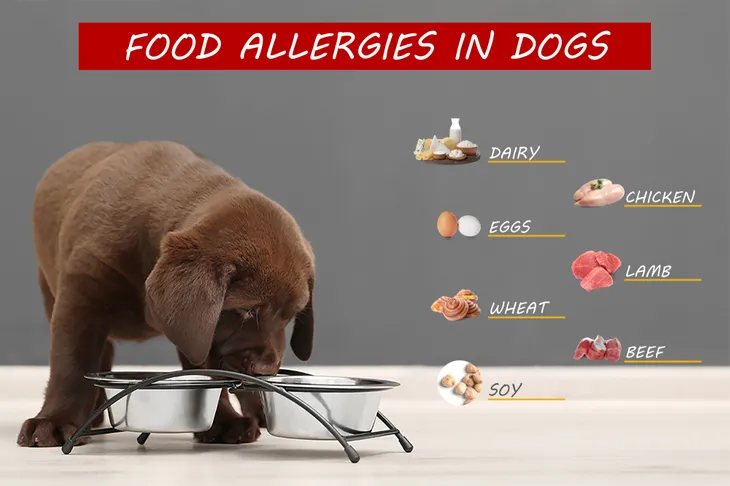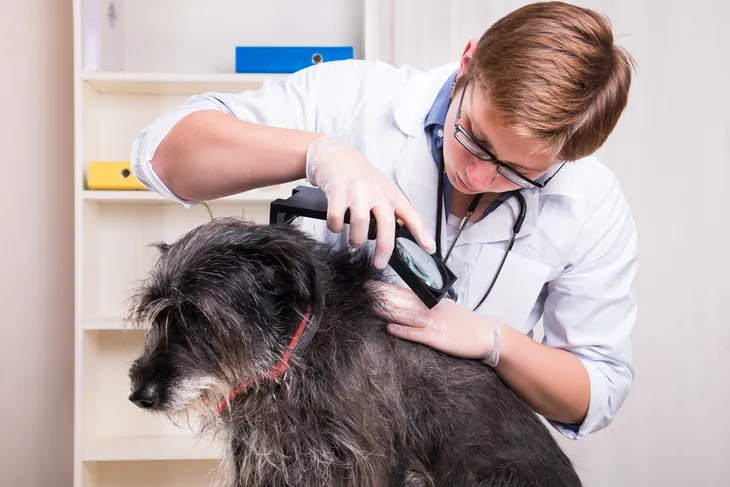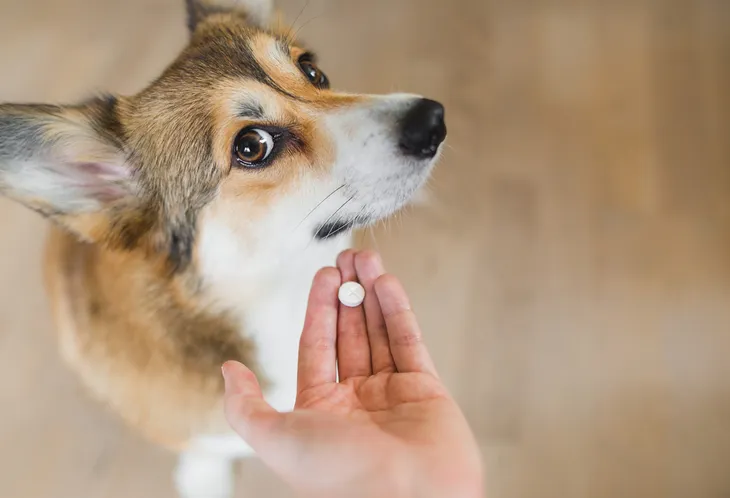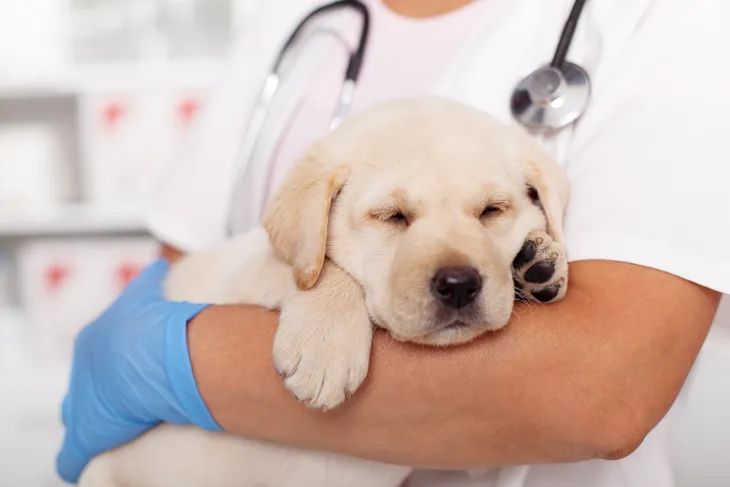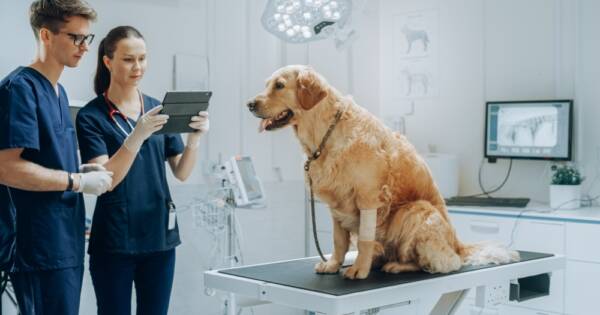There’s nothing worse than noticing that your pup isn’t feeling well. After all, they are family! No one really likes talking about doggy diarrhea but if you own a dog chances are you’ve experienced it. Diarrhea in dogs can be harmless and it might be a side effect of something simple like a change in diet. That said, there is a chance it might be a symptom of an underlying serious illness. This is why getting to the bottom of it is crucial.
Signs that your dog has diarrhea include loose, liquidy stool. They might also need frequent trips outside to relieve themselves. Diarrhea can come on suddenly and can last anywhere from a day to several weeks. But be careful because persistent diarrhea can cause dehydration. Let’s explore some of the most common causes of dog diarrhea and then make sure you talk with your veterinarian if you suspect it is something serious.
Eating Spoiled Food
Does your dog like to take frequent trips to the garbage can, scavenging for tasty leftovers? There’s a chance your dog ate spoiled food and this can cause diarrhea.
By eating spoiled food out of the garbage or even the feces of another animal, your dog can become at risk for an illness called garbage toxicosis, also called garbage gut. When the bacteria from the contaminated waste enters the digestive tract, it produces toxins that get absorbed in their bloodstream.
Common symptoms of garbage toxicosis are watery or bloody diarrhea, fever, and vomiting. In severe cases, your dog may experience the inability to control body movements, hypothermia, and even shock. If you think your dog may have eaten something contaminated it’s time to take them to the vet.
Change in Diet
Have you recently changed your dog’s food? A change in diet could be the root cause behind your dog’s diarrhea. This is because your dog’s digestive system may need some time to adjust to the new food formula.
To prevent this from happening you may want to try introducing new food gradually. Simply mix some of your dog’s old food with small amounts of the new food and gradually decrease the old and increase the new until they have adjusted.
Stress
Just like humans, dogs can be affected by stress too. Unfortunately, our furry friends can’t voice their feelings so it can be hard to tell when they are stressed.
Fortunately, there are some signs you can look out for that may indicate that they are stressed. If your dog is stressed they may lose their appetite, seek isolation, sleep more than usual, and may also have diarrhea and other digestive issues.
Make sure you have a chat with your vet if you notice any behavioral changes, and if the diarrhea is severe, showx signs of blood, or if it has lasted longer than 24-hours.
Food Allergies and Intolerances
Did you know dogs can suffer from food allergies and intolerances, just like us? A food allergy can present itself in a few different ways such as itchy skin, frequent ear infections, and upset digestion such as vomiting and diarrhea.
The most common foods that can cause an allergic reaction are proteins such as chicken, beef, lamb, dairy products, chicken eggs, soy, and gluten. If you suspect their diarrhea may be caused by a food allergy or intolerance your vet is likely to put your dog on an elimination diet to find out which foods are causing the problem.
Parasites
Your dog’s diarrhea may be the side effect of a parasite! Parasites are organisms that live on/in a host organism and they get their food from the expense of their host (your dog). Common intestinal parasites in dogs include hookworms, roundworms, tapeworms, whipworms, giardia, and coccidia.
These tiny parasites can attach themselves to your pup’s intestinal wall and cause damage such as foul-smelling diarrhea (with or without blood) and even weight loss. Thankfully your vet will be able to determine if your dog has a parasite by examining a stool sample.
Medications
Like humans, dogs can experience diarrhea as a side effect of certain pet medications. Dr. Jules Benson, VP of Veterinary Services at Petplan pet insurance says, “Diarrhea can also be a common side effect of some pet medications, including antibiotics, non-steroidal anti-inflammatory drugs, and heart medications,”
If you suspect the diarrhea is caused by medication your dog is taking be sure to monitor your pup. Ensure they’re getting enough water to stay hydrated and if it continues after 24 hours you may want to speak to your vet for advice on what steps you can take.
Bacterial Infections
Our dogs are exposed to bacteria every day and in most cases, they’re strong enough to fight it off. That said if your dog has a weakened immune system bacteria may be able to spread causing your pooch to become ill.
Common types of pathogenic bacteria in dogs include Salmonella, Campylobacter, Clostridium, and E. Coli. The most common sources of bacteria come from contaminated water, feces, undercooked meat, and dairy. You should also be on the lookout for recalled dog food. If your dog is sick with a bacterial infection they will often show signs of upset digestion including vomiting and diarrhea and in some cases, they will have a fever.
If you suspect that your dog may have a bacterial infection talk with your vet immediately. They will most likely treat the infection with antibiotic drugs.
Viral Diseases
Dogs are also susceptible to viral diseases that can cause diarrhea. Viral diseases like distemper, coronavirus, and parvovirus are all serious diseases that can cause foul-smelling diarrhea and are very contagious.
Distemper is an airborne virus that attacks the respiratory, gastrointestinal, and nervous systems of puppies and dogs. Parvovirus and canine coronavirus are also highly contagious and is usually spread through oral contact with infected fecal matter. If these viruses are left untreated they can be fatal so make sure you get your dog to the vet as soon as possible if you suspect they may have one of these viral diseases. Thankfully there are vaccines available that can help protect your pup from these diseases.
Consuming Foreign Objects
Some pups are just so curious and find things like dirty socks and toys exciting. So exciting that sometimes they’ll ingest them. If this sounds like your dog, this may be the cause of their diarrhea.
Smaller objects and substances such as grass, string, and sticks should pass through their stool but if your dog appears to be in distress they could have consumed something larger. In that case, it’s advised that you seek veterinary care immediately. If this happens, the vet will take x-rays to locate the object and then will most likely perform surgery to remove the object.
Consuming Toxic Substances
Did you know some of your house plants might be toxic for your dog? Plants like aloe, monstera, fiddle leaf fig, daffodils, ivy, and more are culprits that can cause not only diarrhea, but vomiting, drooling, oral irritation, and swelling in the mouth.
House plants aren’t the only toxic substances you need to be on the lookout for. Some wild mushrooms, as well as common household items like sunscreen, human medication, and vitamins, and some foods can be very toxic for your dog too. Make sure you do your research and steer your pup clear from toxic substances.
Inflammatory Bowel Disease and Irritable Bowel Syndrome
Inflammatory Bowel Disease (IBD) and Irritable Bowel Syndrome (IBS) are two different conditions that could be the culprit to your dog’s diarrhea. IBD is a chronic condition where symptoms don’t go away whereas IBS may come and go.
Unfortunately, no one really knows what causes both IBD and ISB but they are often diagnosed once other potential causes have been ruled out. Signs and symptoms of IBS include interment spells of diarrhea, bloating, abdominal pain, loss of appetite, lethargy, and vomiting. If your dog is experiencing similar symptoms but they don’t happen intermittently and do happen daily then your dog may have IBD.
Serious Illness
Diarrhea can often be treated at home but there are some cases where diarrhea can be the symptom of an underlying serious illness. Dogs can suffer from kidney and liver disease and diarrhea is unfortunately one of the common symptoms. Other alarming symptoms are blood present in diarrhea and/or urine, vomiting, sudden weight loss, and behavioral changes.
The bottom line is you know your dog best. If you notice they are acting abnormal, are showing signs of a potentially serious illness, or if you are concerned about their diarrhea bouts, then get them checked by your veterinarian as soon as possible. Your vet will be able to run a variety of tests to determine the root cause.




